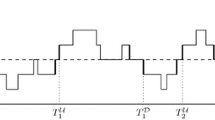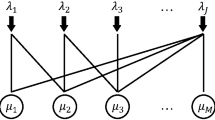Abstract
We consider the problem of finding a decomposed solution to a queueing model where the action rates may depend on the global state space. To do this we consider regular cycles in the underlying state space and show that a semi-product-form solution exists when the functions describing the action rates have specific forms. The approach is shown in detail for two queues and shown to extend to larger systems. Although not all the results for semi-product-form solutions are entirely new, the method by which they are derived is both novel, intuitive and leads to generalisations.
Access this chapter
Tax calculation will be finalised at checkout
Purchases are for personal use only
Preview
Unable to display preview. Download preview PDF.
Similar content being viewed by others
References
Balbo, G., Bruell, S., Sereno, M.: Embedded processes in generalized stochastic Petri nets. In: Proc. 9th Intl. Workshop on Petri Nets and Performance Models, pp. 71–80 (2001)
Balsamo, S., Harrison, P.G., Marin, A.: Systematic Construction of Product-Form Stochastic Petri-Nets (submitted for publication)
Balsamo, S., Marin, A.: Product-form solutions for models with joint-state dependent transition rates. In: Al-Begain, K., Fiems, D., Knottenbelt, W.J. (eds.) Analytical and Stochastic Modeling Techniques and Applications. LNCS, vol. 6148, pp. 87–101. Springer, Heidelberg (2010)
Baskett, F., Chandy, K., Muntz, R., Palacios, F.: Open, Closed, and Mixed Networks of Queues with Different Classes of Customers. Journal of the ACM 22(2), 248–260 (1975)
Bonald, T., Proutiere, A.: Insensitivity in processor-sharing networks. Performance Evaluation 49, 193–209 (2002)
Boucherie, R.J.: A Characterisation of Independence for Competing Markov Chains with Applications to Stochastic Petri Nets. IEEE Trans. on Software Eng. 20(7), 536–544 (1994)
Boucherie, R.J., van Dijk, N.M.: Product-forms for queueing networks with state-dependent multiple job transitions. Advances in Applied Probability 23, 152–187 (1991)
Chao, X., Miyazawa, M., Pinedo, M.: Queueing Networks: Customers, Signals and product-form Solutions. Wiley, Chichester (1999)
Fourneau, J.-M., Plateau, B., Stewart, W.J.: An algebraic condition for product form in stochastic automata networks without synchronizations. Performance Evaluation 85, 854–868 (2008)
Harrison, P.G.: Turning back time in Markovian process algebra. In: Theoretical Computer Science (January 2003)
Harrison, P.G., Lee, T.T.: Separable equilibrium state probabilities via time reversal inmarkovian process algebra. Theoretical Computer Science (2005)
Harrison, P.G.: Compositional reversed Markov processes, with applications to G-networks. Performance Evaluation (2004)
Harrison, P.G.: Product-forms and functional rates. Performance Evaluation 66, 660–663 (2009)
Henderson, W., Taylor, P.G.: Embedded Processes in Stochastic Petri Nets. IEEE Trans. on Software Eng. 17(2), 108–116 (1991)
Henderson, W., Taylor, P.G.: State-dependent Coupling of Quasireversible Nodes. Queueing Systems: Theory and Applications 37(1/3), 163–197 (2001)
Kelly, F.P.: Reversibility and stochastic networks. Wiley, Chichester (1979)
Serfozo, R.: Markovian network processes: congestion-dependent routing and processing. Queueing Systems: Theory and Applications 5(1-3), 5–36 (1989)
Harrison, P.G., Thomas, N.: Product-form solution in PEPA via the reversed process. In: Next Generation Internet: Performance Evaluation and Applications. LNCS, vol. 5233. Springer, Heidelberg (2010)
Author information
Authors and Affiliations
Editor information
Editors and Affiliations
Rights and permissions
Copyright information
© 2010 Springer-Verlag Berlin Heidelberg
About this paper
Cite this paper
Thomas, N., Harrison, P. (2010). State-Dependent Rates and Semi-Product-Form via the Reversed Process. In: Aldini, A., Bernardo, M., Bononi, L., Cortellessa, V. (eds) Computer Performance Engineering. EPEW 2010. Lecture Notes in Computer Science, vol 6342. Springer, Berlin, Heidelberg. https://doi.org/10.1007/978-3-642-15784-4_14
Download citation
DOI: https://doi.org/10.1007/978-3-642-15784-4_14
Publisher Name: Springer, Berlin, Heidelberg
Print ISBN: 978-3-642-15783-7
Online ISBN: 978-3-642-15784-4
eBook Packages: Computer ScienceComputer Science (R0)




